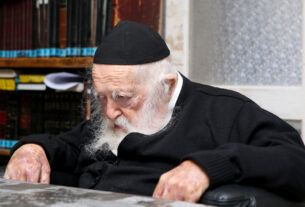(New York Jewish Week) — Jewish students at Columbia University said at a press conference on Monday that they and their peers on campus had been subjected to a series of antisemitic incidents in recent weeks, including death threats. They demanded the university administration take action to protect Jews on campus.
The press conference came after a series of antisemitic and anti-Israel actions at the school in the wake of Hamas’ Oct. 7 attack on Israel, which killed and wounded thousands and led to Israel declaring war on the terror group.
An Israeli student was assaulted in the days after the attack in what police charged as a hate crime. A statement signed by a range of student groups placed blame for the Oct. 7 attack on Israel. After a swastika was found in a bathroom in the school’s International Affairs Building last Friday, Keren Yarhi-Milo, the dean of the School of International and Public Affairs, said, “I am shocked and dismayed that anyone would promote this most notorious symbol of antisemitism, hatred, and racial supremacy.”
Dozens of Columbia faculty in a letter published Monday called the Hamas attack a “military action” linked to Israel’s occupation.
Police and Jewish security groups have reported a spike in antisemitic incidents since the start of the war in the New York region and around the country. Recent incidents in New York, where Jews are targeted by hate crimes far more than any other group, have ranged from physical assaults to graffiti and harassment.
Monday’s press conference took place outside the gates of the school’s campus in Morningside Heights and did not appear to be organized by a student group. At least three of the four student speakers, however, have spoken to the media in recent weeks about antisemitism on campus, and the event was publicized by a professional public relations agency. Around 20 students attended.
The students said the school’s administration did not take sufficient action after receiving reports of antisemitism, and has not held perpetrators accountable.
“As a result of this inaction, there are Jewish students who do not feel physically safe on campus,” Noa Fay, a senior at Barnard College, said in a statement.
Among the incidents the students listed were the swastika graffiti, students carrying signs saying “resistance is not terrorism” during an on-campus walkout and, at Columbia’s law school, a student saying “F— the Jews” to a visibly Jewish student. They also said Jews were targeted with antisemitic tropes in group chats. Reached by the New York Jewish Week, the university did not confirm or deny any of the incidents.
“With my own eyes I have witnessed Columbia students resort to based bigotry,” junior Yoni Kurtz said, according to the New York Post. “I’ve seen them parrot foul antisemitic tropes, I’ve seen them label visibly Muslim students as terrorists, I’ve seen them roar in approval for calls of violence against civilians, and I’ve seen them take to social media nearly every day of the last three weeks to call for each other’s deaths.”
The students demanded the university clarify its policies on identity-based bigotry, including antisemitism; enforce those policies; devote more funding and staff to supporting student victims; and create spaces to bring students together from different backgrounds.
“The university’s lack of a meaningful, practical response to these acts of blatant antisemitism is incredibly disheartening,” said sophomore Jessie Brenner. “Students of all religious identities, political affiliations, and ethnicities deserve to feel safe on campus and supported by the administration.”
Support the New York Jewish Week
Our nonprofit newsroom depends on readers like you. Make a donation now to support independent Jewish journalism in New York.
The activists also demanded the administration publicly condemn Hamas and treat students who support the terror group differently from those who support Palestinian rights. The administration has released several statements since Oct. 7, but none has mentioned the terror group.
“If these measures are not taken, we fear that campus will only continue to become more divisive, more volatile and more unsafe,” said Kurtz.
Following the press conference, the university told the New York Jewish Week, “Antisemitism or any other form of hate are antithetical to Columbia’s values and can lead to acts of harassment or violence. When this type of speech is unlawful or violates university rules, it will not be tolerated.”
A university spokesperson added, “We are using every available tool to keep our community safe and that includes protecting our Jewish students from antisemitic discrimination or harassment.”
The university has made a series of statements since the Oct. 7 attack, which has led to a spike in antisemitism worldwide. Two days after the attack, Columbia University President Minouche Shafik said that she was “devastated by the horrific attack on Israel.”
In a separate statement earlier this month, Shafik said, “Some are using this moment to spread antisemitism, Islamophobia, bigotry against Palestinians and Israelis.”
She added, “I have been disheartened that some of this abhorrent rhetoric is coming from members of our community, including members of our faculty and staff.”
On Oct. 12, three Columbia administrators released a statement on the conflict, condemning antisemitism and Islamophobia and saying, “We reject and will not tolerate hate speech, violence, or the threat or any acts of violence in our community.”
Jewish students have also faced threats on other campuses in New York City and state. Last week, Jewish students at New York City’s Cooper Union college sheltered in the school’s library as pro-Palestinian demonstrators pounded on the door and shouted slogans. On Sunday, police at Cornell University were called to the school’s kosher dining hall, and the campus Hillel warned students to stay away from it, after anonymous antisemitic posts on a Greek life website that included threats to “shoot up” the building and kill and rape Jewish students. A suspect was arrested on Tuesday.




